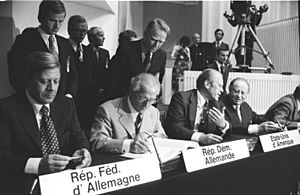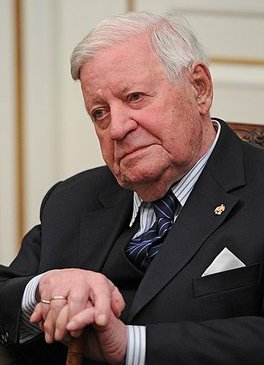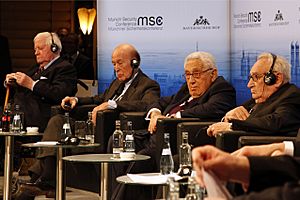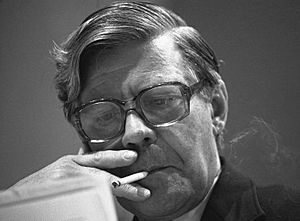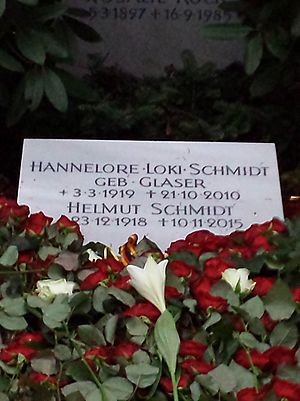Helmut Schmidt facts for kids
Quick facts for kids
Helmut Schmidt
|
|||||||||||||||||||||||||||||||||||||||||||||||
|---|---|---|---|---|---|---|---|---|---|---|---|---|---|---|---|---|---|---|---|---|---|---|---|---|---|---|---|---|---|---|---|---|---|---|---|---|---|---|---|---|---|---|---|---|---|---|---|
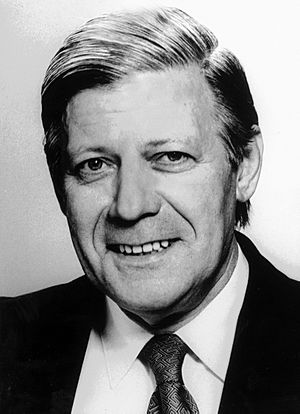
Schmidt in 1977
|
|||||||||||||||||||||||||||||||||||||||||||||||
| Chancellor of Germany | |||||||||||||||||||||||||||||||||||||||||||||||
| In office 16 May 1974 – 1 October 1982 |
|||||||||||||||||||||||||||||||||||||||||||||||
| President | |||||||||||||||||||||||||||||||||||||||||||||||
| Vice-Chancellor |
|
||||||||||||||||||||||||||||||||||||||||||||||
| Preceded by | Willy Brandt | ||||||||||||||||||||||||||||||||||||||||||||||
| Succeeded by | Helmut Kohl | ||||||||||||||||||||||||||||||||||||||||||||||
| Minister of Finance | |||||||||||||||||||||||||||||||||||||||||||||||
| In office 7 July 1972 – 16 May 1974 |
|||||||||||||||||||||||||||||||||||||||||||||||
| Chancellor | Willy Brandt | ||||||||||||||||||||||||||||||||||||||||||||||
| Preceded by | Karl Schiller | ||||||||||||||||||||||||||||||||||||||||||||||
| Succeeded by | Hans Apel | ||||||||||||||||||||||||||||||||||||||||||||||
| Minister for Economics | |||||||||||||||||||||||||||||||||||||||||||||||
| In office 7 July 1972 – 15 December 1972 |
|||||||||||||||||||||||||||||||||||||||||||||||
| Chancellor | Willy Brandt | ||||||||||||||||||||||||||||||||||||||||||||||
| Preceded by | Karl Schiller | ||||||||||||||||||||||||||||||||||||||||||||||
| Succeeded by | Hans Friderichs | ||||||||||||||||||||||||||||||||||||||||||||||
| Minister of Defence | |||||||||||||||||||||||||||||||||||||||||||||||
| In office 22 October 1969 – 7 July 1972 |
|||||||||||||||||||||||||||||||||||||||||||||||
| Chancellor | Willy Brandt | ||||||||||||||||||||||||||||||||||||||||||||||
| Preceded by | Gerhard Schröder | ||||||||||||||||||||||||||||||||||||||||||||||
| Succeeded by | Georg Leber | ||||||||||||||||||||||||||||||||||||||||||||||
| Leader of the Social Democratic Party in the Bundestag | |||||||||||||||||||||||||||||||||||||||||||||||
| In office 14 March 1967 – 22 October 1969 |
|||||||||||||||||||||||||||||||||||||||||||||||
| Deputy |
|
||||||||||||||||||||||||||||||||||||||||||||||
| Preceded by | Fritz Erler | ||||||||||||||||||||||||||||||||||||||||||||||
| Succeeded by | Herbert Wehner | ||||||||||||||||||||||||||||||||||||||||||||||
| Senator of the Interior of Hamburg | |||||||||||||||||||||||||||||||||||||||||||||||
| In office 13 December 1961 – 14 December 1965 |
|||||||||||||||||||||||||||||||||||||||||||||||
| First Mayor |
|
||||||||||||||||||||||||||||||||||||||||||||||
| Preceded by | Wilhelm Kröger | ||||||||||||||||||||||||||||||||||||||||||||||
| Succeeded by | Heinz Ruhau | ||||||||||||||||||||||||||||||||||||||||||||||
|
|||||||||||||||||||||||||||||||||||||||||||||||
| Personal details | |||||||||||||||||||||||||||||||||||||||||||||||
| Born |
Helmut Heinrich Waldemar Schmidt
23 December 1918 Barmbeck, Hamburg, Weimar Republic (now Germany) |
||||||||||||||||||||||||||||||||||||||||||||||
| Died | 10 November 2015 (aged 96) Hamburg, Germany |
||||||||||||||||||||||||||||||||||||||||||||||
| Resting place | Ohlsdorf Cemetery | ||||||||||||||||||||||||||||||||||||||||||||||
| Political party | Social Democratic (1946–2015) | ||||||||||||||||||||||||||||||||||||||||||||||
| Spouse |
Hannelore Glaser
(m. 1942; died 2010) |
||||||||||||||||||||||||||||||||||||||||||||||
| Domestic partner | Ruth Loah (2012–2015) | ||||||||||||||||||||||||||||||||||||||||||||||
| Children | 2 | ||||||||||||||||||||||||||||||||||||||||||||||
| Alma mater | University of Hamburg | ||||||||||||||||||||||||||||||||||||||||||||||
| Occupation |
|
||||||||||||||||||||||||||||||||||||||||||||||
| Signature |  |
||||||||||||||||||||||||||||||||||||||||||||||
| Military service | |||||||||||||||||||||||||||||||||||||||||||||||
| Allegiance | Nazi Germany | ||||||||||||||||||||||||||||||||||||||||||||||
| Branch/service | Luftwaffe | ||||||||||||||||||||||||||||||||||||||||||||||
| Years of service | 1937–1945 | ||||||||||||||||||||||||||||||||||||||||||||||
| Rank | Oberleutnant (d.R.) | ||||||||||||||||||||||||||||||||||||||||||||||
| Unit | 1st Panzer Division | ||||||||||||||||||||||||||||||||||||||||||||||
| Battles/wars | |||||||||||||||||||||||||||||||||||||||||||||||
| Awards | Iron Cross 2nd Class | ||||||||||||||||||||||||||||||||||||||||||||||
Helmut Schmidt (born December 23, 1918 – died November 10, 2015) was an important German politician. He was a member of the Social Democratic Party of Germany (SPD). Schmidt served as the Chancellor of West Germany from 1974 to 1982.
Before becoming Chancellor, he held several key government jobs. He was the Minister of Defence from 1969 to 1972. Then, he became the Minister of Finance from 1972 to 1974. In this role, he was praised for his smart financial decisions. He also briefly served as Minister of Economics.
As Chancellor, Schmidt focused on international relations. He wanted Europe to work closely with the United States. He also helped create the European Monetary System in 1978. This system aimed to stabilize currencies in Europe. He was re-elected Chancellor in 1976 and 1980. However, his government ended in 1982 when his allies, the Free Democratic Party, left the coalition.
He left Parliament in 1986. Later, he strongly supported a common European currency and a European Central Bank.
Contents
Early Life and Education
Helmut Schmidt was born in 1918 in Barmbek, a part of Hamburg, Germany. His parents, Ludovica and Gustav Schmidt, were both teachers. He had one younger brother.
Schmidt went to Hamburg Lichtwark School and finished in 1937. He was part of the Hitler Youth organization for a while. However, he was known for having views against the Nazi party.
In 1942, he married his childhood sweetheart, Hannelore "Loki" Glaser. They had two children. Their son, Helmut Walter, died as a baby. Their daughter, Susanne, became a journalist. After World War II, Schmidt went back to school. He studied economics and political science at the University of Hamburg, graduating in 1949.
Military Service in World War II
Schmidt joined the military in 1937 when he was 18. He served in an anti-aircraft unit of the German air force (Luftwaffe).
During World War II, he served briefly on the Eastern Front in 1941. This included the Siege of Leningrad. He then returned to Germany to work as a trainer. He was awarded the Iron Cross 2nd Class for his service.
Towards the end of the war, from late 1944, he served on the Western Front. He was part of the Battle of the Bulge. In April 1945, British forces captured him. He was a prisoner of war until August of that year.
Political Career Begins
After the war, Schmidt joined the Social Democratic Party of Germany (SPD) in 1946. From 1947 to 1948, he led the Socialist German Student League. After finishing university, he worked for the city government of Hamburg.
In 1953, he was elected to the Bundestag, which is the German parliament. He was known for speaking his mind. People even nicknamed him Schmidt-Schnauze, which means "Schmidt the Lip." He was against nuclear weapons being used by the German army. In 1962, he left his seat in parliament to focus on his work in Hamburg.
Leading Hamburg's Interior
From 1961 to 1965, Schmidt was the Innensenator of Hamburg. This means he was the senator for the interior, in charge of things like police and public safety. He became known as a Macher, or "doer," because he got things done.
He showed strong leadership during the terrible North Sea flood of 1962. This flood caused many deaths and left thousands homeless. Schmidt took charge, even using the federal police and army, which was unusual at the time. He helped save many lives and quickly found new homes for those affected. He famously said, "I wasn't put in charge of these units – I took charge of them!"
Return to National Politics
In 1965, Schmidt was re-elected to the Bundestag. In 1967, he became the leader of the Social Democratic parliamentary group. He held this position until 1969.
In October 1969, he joined the government of Chancellor Willy Brandt as the Minister of Defence. During his time, he reduced the required military service time. He also helped create universities for German officers. In July 1972, he became the Minister for Economics and Finance. He later focused only on finance, dealing with rising inflation.
Chancellor of West Germany (1974–1982)
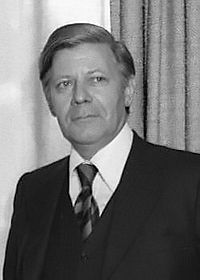 |
|
|
Chancellorship of Helmut Schmidt
|
|
|---|---|
| 16 May 1974 – 1 October 1982 | |
| Cabinet |
|
| Party | Social Democratic Party |
| Election |
|
| Appointer |
|
| Nominator | Bundestag |
| Seat | Palais Schaumburg |
|
← Willy Brandt • Helmut Kohl →
|
|
Schmidt became Chancellor of West Germany on May 16, 1974. This happened after Chancellor Brandt resigned due to a spy scandal. The biggest challenge for Schmidt's government was a worldwide economic slowdown. He took a firm approach, reducing government spending.
Schmidt worked hard to improve relations with France. With French President Valéry Giscard d'Estaing, he helped start the world economic summits in 1975. He also signed the Helsinki Accords in 1975. This agreement aimed to improve security and cooperation in Europe. In 1978, he helped create the European Monetary System (EMS).
He remained Chancellor after the 1976 and 1980 elections. He led a government with the liberal Free Democratic Party. Schmidt took a tough stance against extremist groups like the Red Army Faction. In 1977, he ordered a special police unit to end the hijacking of a Lufthansa plane in Mogadishu, Somalia. All 86 passengers were rescued safely.
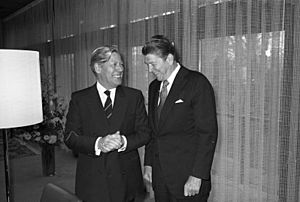
In 1980, Schmidt was re-elected. He was worried about the Soviet Union's actions, especially their invasion of Afghanistan. He proposed the NATO Double-Track Decision. This plan involved placing medium-range nuclear missiles in Western Europe if the Soviets did not reduce their own missiles. This decision was not popular with many Germans.
West Germany managed the global economic challenges of the 1970s better than many other countries. Unemployment and inflation stayed relatively low. Pensions and unemployment benefits also increased during his time.
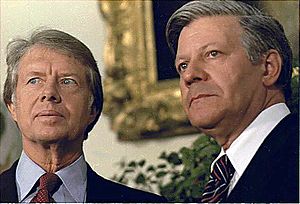
Towards the end of his time as Chancellor, the economy worsened. Schmidt had to make some cuts to welfare programs. His party, the SPD, disagreed with his security policies. On October 1, 1982, the parliament voted him out of office. Helmut Kohl became the new Chancellor. This was the first time a German Chancellor was removed in this way.
Social Improvements Under Schmidt
Even with economic challenges, Schmidt's government made many social improvements.
- Pensions: Pensions for older people increased.
- Family Support: Monthly payments for children increased significantly in 1975.
- Disabled Persons: Laws were passed to improve support and rehabilitation for disabled people.
- Occupational Pensions: Rules were made to ensure workers kept their company pensions even if they left a job.
- Housing: Laws were introduced to help with housing renovation and energy saving.
- Worker Rights: A system was put in place to give employees more say on company boards.
- Youth Employment: Laws limited working hours for young people and raised the minimum working age. Programs were created to help young people find jobs and training.
- Consumer Protection: New laws protected consumers from harmful products and unfair sales terms.
- Divorce Reform: Laws were changed to make divorce fairer, especially for the economically weaker partner. Married women gained the right to work without their husbands' permission.
- Immigrant Rights: Foreign residents gained the right to unlimited residence permits after five years.
- Parental Leave: Paid parental leave was extended for working mothers.
Life After Politics
After leaving politics, Helmut Schmidt remained very active. In 1982, he helped create the annual AEI World Forum. He also became a co-publisher of the weekly newspaper Die Zeit. He was its director from 1985 to 1989.
Schmidt was a strong supporter of a common European currency. However, he was against Turkey's bid to join the EU. He also disagreed with phasing out nuclear energy in Germany. In his later years, he was known for his wisdom and became a respected "elder statesman" in Germany.
He wrote many books about his political life and foreign policy. He often appeared on television talk shows.
Friendships
Schmidt had many important friends in politics. These included Egyptian president Anwar Sadat and French ex-president Valéry Giscard d'Estaing. He was also close with former Singapore Prime Minister Lee Kuan Yew and former U.S. Secretary of State Henry Kissinger. Kissinger once said he wouldn't want to live in a world without Schmidt.
He was also good friends with former Canadian Prime Minister Pierre Trudeau. They often discussed important political and economic topics.
Personal Life
Schmidt was a talented piano player. He even recorded piano concertos by famous composers like Mozart and Bach. He played with well-known musicians like Christoph Eschenbach.
Helmut Schmidt was known for being a heavy smoker throughout his life. He often smoked during TV interviews. In 1981, he had a cardiac pacemaker fitted.
His wife of 68 years, Loki Schmidt, passed away in 2010. In 2012, at 93 years old, Schmidt shared that he had found a new life partner, Ruth Loah, who had been his associate for many years.
Death and Funeral
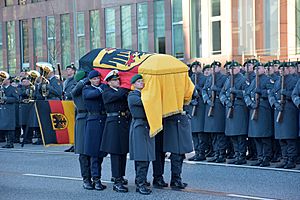
Helmut Schmidt passed away in his Hamburg home on November 10, 2015, at the age of 96. At the time, he was the longest-lived German Chancellor in history.
A state funeral was held for him on November 23 at St. Michael's Church in Hamburg. Many important figures attended, including German Chancellor Angela Merkel and former U.S. Secretary of State Henry Kissinger. Kissinger spoke at the funeral, praising Schmidt's "vision and courage." Schmidt was buried in the Ohlsdorf Cemetery in the family grave, next to his parents and his wife, Loki.
Honours and Awards
Helmut Schmidt received many awards and honours during his life. He chose not to accept the Grand Cross of the Order of Merit of the Federal Republic of Germany, following a tradition from Hamburg.
In 2003, the university of Germany's federal armed forces in Hamburg was renamed Helmut Schmidt University. This was to honour him for introducing academic education for German career officers when he was Minister of Defence.
Freedom of the City
- 1983: Hamburg
- 1983: Bonn
- 1983: Bremerhaven
- 1989: Berlin
- 1995: Güstrow
- 1998: State of Schleswig-Holstein
Honorary Degrees
Schmidt received 24 honorary degrees from universities around the world. These included degrees from Oxford and Cambridge in the UK, Paris Sorbonne, and American universities like Harvard and Johns Hopkins.
Foundations
The Bundeskanzler-Helmut-Schmidt-Stiftung was created in 2016. It aims to honor Helmut Schmidt's achievements and continue work on political issues he cared about. Its main office is in Hamburg.
Awards
- 1978: Theodor Heuss Prize for his leadership during the Red Army Faction terror.
- 1978: Peace Prize of the Louise Weiss Foundation.
- 1988: Red Cross Four Freedoms Award.
- 1990: Friedrich-Schiedel-Literaturpreis for his book Men and Powers.
- 2001: Gold Medal of the Foundation Jean Monnet for his work on European monetary union.
- 2007: Henry Kissinger Prize.
- 2010: Henri-Nannen-Prize for his lifetime work in journalism.
- 2013: Hanns Martin Schleyer Prize.
Books
Helmut Schmidt wrote many books. Here are some of them:
Memoirs
- Menschen und Mächte (Men and Powers), 1987. This book focuses on Cold War politics.
- Die Deutschen und ihre Nachbarn (The Germans and Their Neighbours), 1990. This book focuses on European politics.
- Weggefährten (Companions), 1996. This book shares personal memories and his relationships with other politicians.
Political Books (selection)
- Balance of Power, 1971.
- A Grand Strategy for the West: The Anachronism of National Strategies in an Interdependent World, 1987.
- Men and Powers: A Political Retrospective, 1989.
- Nachbar China (Neighbour China), 2006.
- Ausser Dienst (Out of Service), 2008.
See also
 In Spanish: Helmut Schmidt para niños
In Spanish: Helmut Schmidt para niños
 | Georgia Louise Harris Brown |
 | Julian Abele |
 | Norma Merrick Sklarek |
 | William Sidney Pittman |


